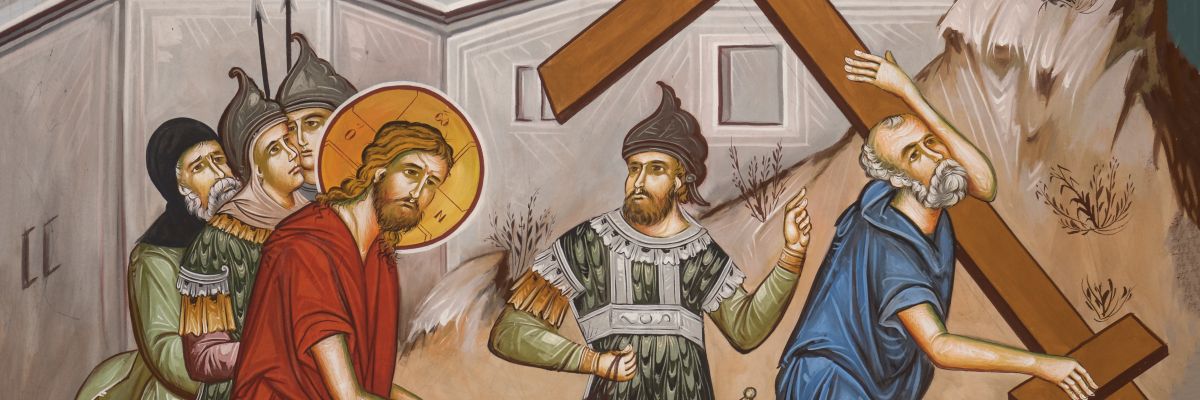
Homily for Palm Sunday, Year A
Look, we pray, O Lord, on this your family,
For whom Our Lord Jesus Christ
Did not hesitate to be delivered into the hands of the wicked
And submit to the agony of the Cross
Who lives and reigns forever and ever. Amen.-Prayer over the People at the Blessing of Passion Sunday Mass
This prayer, which has been prayed in the liturgy of Holy Week since ancient times, gives us the simple key to the spiritual progress we will make at this most sacred moment, even if we can’t tell much difference between before and after! Spiritual progress seems slow to us, but in the eyes of God it is all part of a great, all-at-once providential plan for our growth and eternal happiness.
St. Francis de Sales, perhaps the greatest teacher on God’s providence among all the Doctors of the Church, has a great insight. He tells us that, most of the time, to be abandoned into the arms of God’s provident care means to be abandoned into the arms of other human beings.
It is rare indeed that we experience the power of God’s providence by direction from God or an angel. Usually, God’s plans for us regard our relations with others. Our abandonment, our submission to him, almost always has to do with them.
The Lord Jesus is the most extreme of these cases, since his abandonment regarded the whole human race from its holiest, his Blessed Mother, through the good, the mediocre, the very sinful, the docile, the resistant, the sluggish, the peevish, the ungrateful, the inconstant, the reliable, the unreliable, the harsh, the sweet-tempered, the resentful, the angry, and even the evil and malicious—Judas, and the Sanhedrin. All of these persons made up his Father’s providential plan for his life.
We can’t avoid other people, and the “unavoidable other” is so often the minister of our sanctification and doing of God’s will. In this time of isolation, especially, we must keep this at the forefront of our minds. Spouses are abandoned into each other’s hands, parents into their children’s, children into their parents’, friends into friends’. Our closest abandonments are happily into the hands of those whom we love and who love us.
Of course, we may not always like the way in which they love us. Their ways of doing and thinking, speaking and reasoning (or not reasoning!) are different from our own. Love is a gift, however, and we must receive gifts no matter how they are wrapped up. To accept to be loved by someone else means to accept the gift as given, not always as we would have it. Our preferences about other people, especially those closest to us, are just abstractions. The real husband, wife, son, daughter, friend, father and mother are the ones whose love we accept, and to whom we give love.
The Savior will tell us on Holy Thursday: “A new commandment I give you. Love one another as I have loved you.” Jesus accepts our love, even our feeblest attempts as gifts, because he loves us. And when we offer him trials and thorns and sins, he bears them for our salvation, even to the point of “not hesitating to be delivered into the hands of evil men.” Imagine, he did not hesitate!
Luckily for us, we are rarely handed over to the wicked, but just to the needs and good deeds and foibles and habits of those nearest us. But we hesitate, we grow impatient. Impatience in its word origin means “unwillingness to suffer.” Couldn’t you and I instead bear unhesitatingly bear the way others are, and so imitate the Lord and discover his deepest plans for us?
Do we imagine we have no faults? Only Jesus and Mary were faultless, and yet they did not and do not and never will hold our faults against us. Rather, they willingly, unhesitatingly bore them so that we might be the family of grace and power for which the prayer of today’s liturgy so powerfully intercedes.
Let us thus be on the watch for our short temper, our over-sensitiveness, our petty aversions to others around us. We will find that although Jesus seemed to bear the cross alone, he in fact did not. He wants us to join him in fulfilling the new commandment. Simon of Cyrene, Dismas the Good Thief, St. John the Beloved, St. Longinus the Centurion, St. Joseph of Arimathea, St. Veronica, St. Mary Magdalene, the other holy women, and the Mother of Sorrows all bore the crosses with the Nazarene. Most of them went back to their homes and families and duties of various kinds, so that by his grace they could imitate him in his abandonment into the hands of others.
Jesus looks on this kind of domestic love with even greater pleasure than if we had stood at the foot of the cross. May Our Lady in her compassion teach us this lesson, so that we may see how close by are Nazareth and Calvary, and how much like Jesus crucified and the Mother of Sorrows we really are meant to be: each one in his own, hidden daily Way of the Cross which is the way of God’s providence for each of us. And it is thus that we will live and reign with him forever and ever. Amen!



